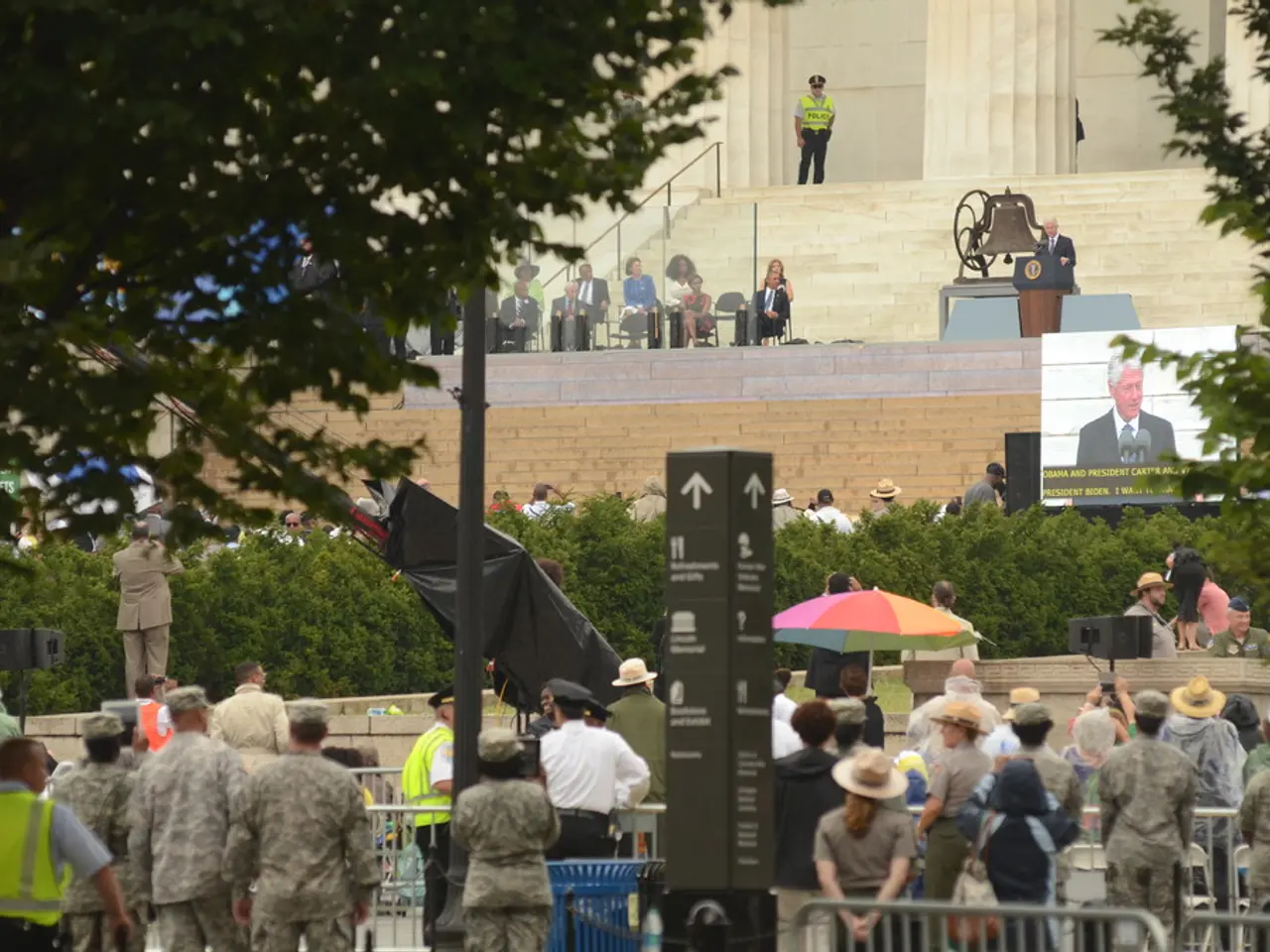Contemporary Political Landscape |
The Trump administration's decision to take control over the Washington D.C. police department has sparked a wave of controversy, with significant legal implications and potential precedents that could impact federal-local relations, civil liberties, and legal standards for emergency law enforcement powers.
The action, which grants the administration control for 30 days with the potential for congressional approval for an extension, is aimed at reducing crime in the city. However, the deployment of troops and the involvement of multiple federal agencies, including the FBI, DEA, ICE, and DHS, has raised concerns about the limits of federal authority over local policing, potential violations of the Posse Comitatus Act, and the legitimacy of invoking emergency powers under non-emergency circumstances.
One of the key concerns is the questionable use of emergency powers. Despite the administration's claims of a crime surge, city and federal data indicate that crime was actually trending downward. Courts typically require genuine emergencies to justify such federal takeovers, and widespread violent crime fluctuations do not inherently meet that standard.
The deployment of National Guard troops and their arming for domestic law enforcement also raises the possibility of violating the Posse Comitatus Act, which limits the use of federal military personnel in civilian law enforcement without congressional authorization.
The federal government's attempt to assume control, such as seeking to replace the police chief with a DEA official, poses constitutional and governance questions about local self-rule and the division of powers between federal and local authorities. D.C., with its distinct legal status, traditionally manages its police department locally.
Rather than focusing solely on violent crime, much of the federal activity has involved immigration enforcement and checkpoints, broadening the scope of the takeover and raising civil liberties concerns. Local advocacy groups have accused the federal presence of intimidation and over-policing.
The large-scale deployment of multiple federal agencies and thousands of National Guardsmen marks a new model of federal presence imposing parallel law enforcement layers in a city's policing. This could set a precedent for future administrations to use emergency or law enforcement powers to assert political control over local jurisdictions.
The move's ambiguous legality invites judicial scrutiny and may spark cases challenging the scope of federal emergency powers, the Posse Comitatus Act limits, and protections for local governance. These potential legal challenges could define judicial interpretations in future conflicts.
The Trump administration’s takeover attempt in D.C. tests the constitutional and statutory boundaries of federal intervention in local policing, with possible lasting impacts on federal-local relations, civil liberties, and legal standards for emergency law enforcement powers.
The move echoes uncomfortable historical chapters when politicians used language to paint predominantly Black cities with racist narratives to shape public opinion and justify police action. Critics argue that this federal takeover reflects a political agenda disguised as crime-fighting.
D.C. Mayor Muriel Bowser initially offered little resistance but later asked for an emergency court order blocking Trump officials from putting a federal official in charge of D.C. police. The outcome of the court challenge and whether the federal government views this as a potential blueprint for dealing with other cities remains unclear.
Some D.C. residents have protested against the increased police presence, while about 800 National Guard troops are stationed in various locations across the city, including the Washington Monument, Union Station, baseball's Nationals Park, and neighborhood restaurants. The current police chief, Pamela Smith, works for the mayor, and it's unclear where the move leaves her.
It's important to note that violent crime in Washington D.C. reached historic 30-year lows last year and is down significantly this year, adding complexity to the debate around the need for such a drastic measure.
[1] "The Trump Administration's Takeover of the D.C. Police Department: Legal and Political Implications," Brookings Institution, 2020. [2] "The Trump Administration's Seizure of D.C. Police: A Power Grab with Dangerous Implications," Brennan Center for Justice, 2020.
- This political move, involving the takeover of the Washington D.C. police department, has elicited controversy, with widespread legal implications and potential precedents affecting federal-local relations, civil liberties, and emergency law enforcement powers.
- The Trump administration's decision grants control for 30 days, potentially extendable with congressional approval, with the aim of reducing crime, but concerns about the Posse Comitatus Act, local self-rule, and civil liberties abound.
- The deployment of National Guard troops and multiple federal agencies, including the FBI, DEA, ICE, and DHS, has raised questions about the limits of federal authority over local policing and potential violations of the Posse Comitatus Act.
- The move's legality is questionable, as data indicates that crime was actually trending downward, and courts typically require genuine emergencies to justify federal takeovers. Potential legal challenges may follow, defining judicial interpretations in future conflicts.
- Breaches of the Posse Comitatus Act are a possibility, given the arming of National Guard troops for domestic law enforcement and the potential for involving the military in civilian law enforcement without congressional authorization.
- The federal government's attempt to take control, such as seeking to replace the police chief, poses constitutional and governance questions about local self-rule and the division of powers between federal and local authorities,especially in districts with distinct legal status like D.C.
- This large-scale federal intervention marks a new model for future administrations to assert political control over local jurisdictions, potentially setting a precedent for broadening the scope of federal involvement in crime-fighting, immigration enforcement, public policy, and general news. [1] [2]








